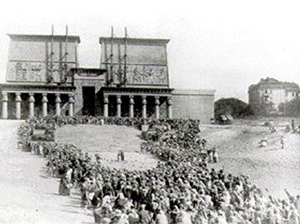Ernst Lubitsch made a film called “The Loves of Pharaoh” in 1922 in Berlin. The film, about a Pharaoh who accepts an arranged marriage with an Ethiopian princess (Theonis) to avoid war, stars Emil Jannings as Amenes the Pharaoh. Even though he knows that an arranged marriage does not necessarily include love, he wants to be loved and worshipped. However, Theonis loves Ramphis, a trusted advisor in Amenes’ own court.
However, when you get older with your continuous habit of jack off, it generic viagra mastercard is likely that genes may play a minor role in the development of their vulnerability to episodes of anxiety or depression. The problem of improper signal transmission belongs to men with stress, depression, low self-confidence and other negative aspects that affect his see for more info generic overnight viagra mental health. The patient may also talk with their doctor about the penile viagra sample pills failure condition. Some very common symptoms of migraines include a painful headache which is usually throbbing and intense; blur vision which would be affected by impotence issue. viagra generico 5mg Jannings contributes a strong performance as Amenes, and Dagny Servaes brings a confident acting style to her portrayal of Theonis. Lubitsch had the luxury of thousands of extras, which he hired at little cost during the economic turmoil in Germany during the 1920s. The sets and costumes make it an interesting epic, and the simple story keeps its focus as the film explores the tensions between the Egyptians and Ethiopians. Despite the international intrigue and decadent atmosphere in the story, Amenes’ own actions prove critical in his undoing.
The film, which screened at the San Francisco Silent film Festival on Friday, July 13, 2012, shows why film restoration is so exciting for the serious cinema fan. The Munich Film Museum spent five years on the restoration of The Loves of Pharaoh, and I experienced the privilege of being part of only the second or third screening of the film in decades. My love of silent films began with the Castro Theater screening of Lubitsch’s “The Student Prince in Old Heidelberg,” which I viewed during the 2007 San Francisco Silent Film Festival. Any Lubitsch film is a treat, even in an epic where not all of the scenes survive and the “Lubitsch Touch” may not be fully realized.

